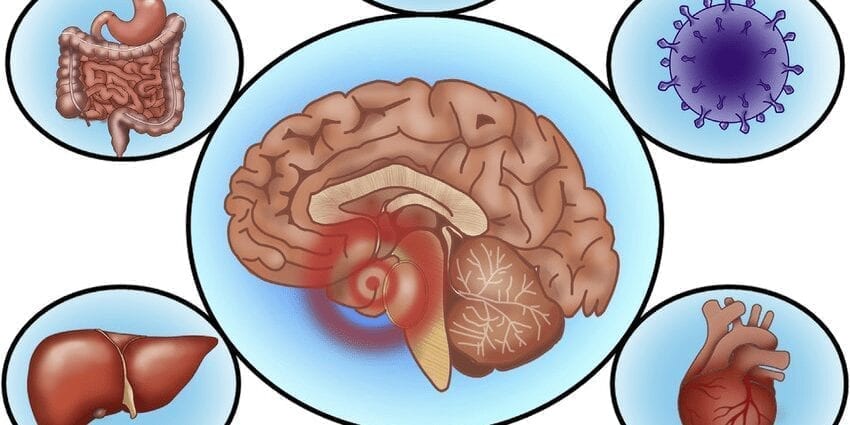Contents
The hypothalamus is a part of the brain responsible for the mechanisms of wakefulness and sleep, changes in body temperature and metabolic processes in the body. The performance of all organs and tissues of the body depends on it. Human emotional reactions are also the responsibility of the hypothalamus. In addition, the hypothalamus directs the work of the endocrine glands, participates in the process of digestion, as well as in the prolongation of the genus. The hypothalamus is located in the brain under the optic hillock – the thalamus. Therefore, the hypothalamus, translated from Latin, means “underhill».
This is interesting:
- The hypothalamus is equal in size to the phalanx of the thumb.
- Scientists have found the centers of “heaven” and “hell” in the hypothalamus. These parts of the brain are responsible for pleasant and unpleasant sensations in the body.
- The division of people into “larks” and “owls” is also in the competence of the hypothalamus
- Scientists call the hypothalamus the “internal sun of the body” and believe that further study of its capabilities can lead to an increase in human life expectancy, to victory over many endocrine diseases, as well as to further exploration of the Cosmos, thanks to controlled lethargic sleep, into which astronauts can be immersed. covering a distance of tens and hundreds of light years.
Healthy foods for the hypothalamus
- Raisins, dried apricots, honey – contain glucose, which is necessary for the full functioning of the hypothalamus.
- Greens and leafy vegetables. An excellent source of magnesium and potassium. They are excellent antioxidants. Protect the hypothalamus from the risk of hemorrhage, stroke.
- Milk and dairy products. They contain B vitamins, which are necessary for the proper functioning of the nervous system, as well as calcium and other nutrients.
- Eggs. Reduce the risk of stroke, due to the content of substances beneficial to the brain.
- Coffee, dark chocolate. In a small amount, they tone up the hypothalamus.
- Bananas, tomatoes, oranges. They cheer you up. Facilitate the work of not only the hypothalamus, but also all structures of the brain. They are useful for the nervous system, the activity of which is closely related to the work of the hypothalamus.
- Walnuts. Stimulates the performance of the hypothalamus. They inhibit the aging process of the brain. They are rich in healthy fats, vitamins and minerals.
- Carrot. It slows down the aging process in the body, stimulates the formation of young cells, and participates in the conduction of nerve impulses.
- Seaweed. Contains substances necessary to provide the hypothalamus with oxygen. The large amount of iodine contained in seaweed helps to fight insomnia and irritability, fatigue and stress.
- Fatty fish and vegetable oils. They contain polyunsaturated fatty acids, which are important components of the hypothalamus nutrition. They prevent the deposition of cholesterol, they stimulate the production of hormones.
General recommendations
For the full functioning of the hypothalamus, you need:
- Physical therapy and daily walks in the fresh air (especially in the evening, before bed).
- Regular and nutritious food. A dairy-plant diet is preferred. Doctors advise avoiding overeating.
- Compliance with the daily routine helps the hypothalamus to enter the rhythm of work that is habitual for it.
- Eliminate alcoholic beverages from consumption and get rid of harmful cravings for smoking, which harm the functioning of the nervous system, with the activity of which the hypothalamus is closely connected.
- Exclude watching TV and working at a computer before going to bed. Otherwise, due to a violation of the daylight regime, disturbances in the work of the hypothalamus and the entire nervous system may occur.
- In order to prevent overexcitation of the hypothalamus, it is recommended to wear sunglasses on a bright sunny day.
Traditional methods of restoring the functions of the hypothalamus
The causes of malfunction of the hypothalamus are:
- 1 Infectious diseases, intoxication of the body.
- 2 Violations of the nervous system.
- 3 Weak immunity.
In the first case anti-inflammatory herbs (chamomile, calendula, St. John’s wort) can be used – on the recommendation of a doctor. In case of intoxication, iodine-containing products are useful – chokeberry, seaweed, feijoa, walnuts.
In the second case, in case of disruption of the work of the NS, tonics (chicory, coffee) are used, or vice versa, soothing – tincture of valerian, motherwort and hawthorn, coniferous baths.
With tachycardia and an unreasonable increase in pressure associated with the malfunctioning of the hypothalamus, water procedures are useful: a warm shower followed by vigorous rubbing of the skin.
With depressive conditions, a decoction of St. John’s wort helps well, of course, if there are no medical contraindications for use!
Overexertion of the eyes is believed to cause disturbances in the hypothalamus. Warm eye baths will help relieve unnecessary stress and restore brain function.
Third case – weak immunity, it is successfully treated with tinctures of ginseng, zamanihi, Chinese magnolia vine. Good results for strengthening the immune system are obtained by using royal jelly.
Harmful foods for the hypothalamus
- Alcohol… Causes vasospasm, destruction of hypothalamic cells and disturbances in the functioning of the nervous system.
- Salt… Excess salt causes overexcitation of the nerves that approach the hypothalamus. In addition, very salty food causes an increase in blood pressure, which in some cases can lead to hemorrhages in the brain structures.
- Fat meat… Contains unhealthy fats that can cause plaque in the blood vessels of the brain, disrupting the nutrition of the hypothalamus.










